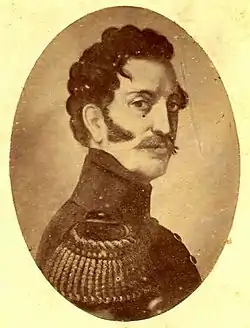
José María Cabal (Guadalajara de Buga, 27 April 1770 - Popayán, 19 August 1816) was a Republican military leader from the Colombian War of Independence.
Biography
He was the son of José Cayetano Cabal and María Teresa Barona. He studied in Popayán and Santafé de Bogotá.
In 1794, he collaborated in the publication of the translation of the Declaration of the Rights of Man and of the Citizen by Antonio Nariño, for which he was sentenced to exile. He continued his studies of chemistry and mineralogy in Paris under the French Revolution.
On his travels, he collected plants that he introduced to New Granada, dedicating himself to agricultural work and scientific studies until the Independence revolution in 1810, in which he participated as a deputy for Caloto, Cauca in the Provisional Government Board of the Confederated Cities of Valle del Cauca.
In 1812, the President of the Confederation, Joaquín Caycedo, moved to Pasto, leaving Cabal as president in Popayán, where he defeated the Royalist troops commanded by Antonio Tenorio, who attempted to take the city in April 1812. Appointed head of the Republican forces, he fought as military leader in several battles in the south of the country between 1813 and 1816. On 5 July 1815, he won the Battle of the Palo River, recovering Popayán, which had been taken by the Royalists.
In 1816, he resigned from command, after the defeat of the Republicans in the Battle of Cuchilla del Tambo. On 29 June he escaped to his ranch, where he was captured. By order of Colonel Francisco Warleta, he was tried and his property was confiscated.
José María Cabal was shot in the main square of Popayán on 19 August 1816.